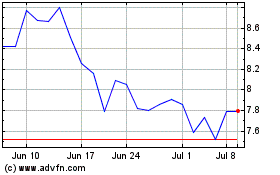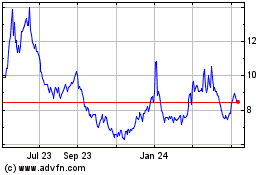Voyager Provides Update on SOD1 ALS Gene Therapy Program
February 11 2025 - 7:00AM

Voyager Therapeutics, Inc. (Nasdaq: VYGR), a biotechnology company
dedicated to advancing neurogenetic medicines, today announced it
has decided to assess alternate payloads related to its gene
therapy program for superoxide dismutase 1 (SOD1) amyotrophic
lateral sclerosis (ALS). Emerging three-month non-human primate
(NHP) data suggest that an alternate payload would be necessary to
achieve the desired product profile. No changes are planned to the
novel capsid component. The same capsid in the VY1706 (tau
silencing) gene therapy program achieved desired activity levels
and was well-tolerated in three-month NHP studies. Voyager no
longer anticipates filing an investigational new drug (IND)
application for VY9323 in mid-2025. Voyager’s cash runway is now
expected to extend into mid-2027; this does not include any
potential milestone payments from existing partnerships.
“Emerging preclinical data indicate the siRNA payload component
of VY9323 does not meet our high standards due to what appears to
be an off-target effect resulting in a narrowed therapeutic window.
While we are disappointed that the development candidate VY9323
will not advance, we hope that we may be able to identify an
alternate payload and find a path forward for this program, given
the unmet need in ALS,” said Alfred W. Sandrock, Jr., M.D., Ph.D.,
Chief Executive Officer of Voyager. “We are encouraged that
our novel TRACER capsids continue to perform consistently across
multiple programs, and we believe they have the potential to
transform gene therapy for CNS diseases. We continue to expect IND
filings in 2025 for our gene therapy candidates for GBA1 and FA,
and in 2026 for VY1706.”
The VY9323 U.S. IND application and Canadian clinical trial
application (CTA) filings had previously been expected to occur in
mid-2025. Given the need to assess potential alternate payloads,
Voyager will provide an update on expected timing for its SOD1 ALS
program when appropriate. The decision on the SOD1 ALS program does
not impact Voyager’s other gene therapy programs; the Company
continues to expect IND filings in 2025 from Neurocrine Biosciences
for the program in GBA1 Parkinson’s and other GBA1-mediated
diseases, as well as the program in Friedreich’s ataxia. Voyager
also continues to expect to file an IND in 2026 for VY1706. The
Company is presenting additional data at the Oppenheimer
25th Annual Healthcare Life Sciences
Conference today at 2:40 p.m. ET. A copy of the
presentation can be accessed by visiting
https://ir.voyagertherapeutics.com/events-presentations and will be
available on the Company’s website for at least 90 days from the
date of the presentation.
About Voyager TherapeuticsVoyager Therapeutics,
Inc. (Nasdaq: VYGR) is a biotechnology company dedicated to
leveraging the power of human genetics to modify the course of –
and ultimately cure – neurological diseases. Our pipeline includes
programs for Alzheimer’s disease, amyotrophic lateral sclerosis
(ALS), Parkinson’s disease, and multiple other diseases of the
central nervous system. Many of our programs are derived from our
TRACER™ AAV capsid discovery platform, which we have used to
generate novel capsids and identify associated receptors to
potentially enable high brain penetration with genetic medicines
following intravenous dosing. Some of our programs are wholly
owned, and some are advancing with partners including Alexion,
AstraZeneca Rare Disease; Novartis Pharma AG; and Neurocrine
Biosciences, Inc. For more information, visit
www.voyagertherapeutics.com.
Voyager Therapeutics® is a registered trademark, and TRACER™ is
a trademark, of Voyager Therapeutics, Inc.
Forward-Looking Statements
This press release contains forward-looking statements for the
purposes of the safe harbor provisions under The Private Securities
Litigation Reform Act of 1995 and other federal securities laws.
The use of words such as “expect,” “anticipate,” “potential,”
“may,” “plan,” “future,” “suggest,” “would,” “believe,” “will,” or
“continue,” and other similar expressions are intended to identify
forward-looking statements.
For example, all statements Voyager makes regarding Voyager’s
plans for the future of its SOD1 ALS gene therapy program,
including its plan to assess alternate payloads for the program and
expectations with respect to providing further updates on the
program; Voyager’s beliefs regarding the potential cause of
development candidate VY9323’s failure to achieve the desired
product profile, including Voyager’s belief that such failure is
not related to the capsid; Voyager’s cash runway; and Voyager’s
ability to advance its AAV-based gene therapy programs and tau
antibody program, including expectations for Voyager’s achievement
of preclinical and clinical development milestones for its
potential development candidates, such as the identification of
lead development candidates, IND and CTA filings, the initiation of
clinical trials, clinical trial enrollment, and the generation of
clinical data and proof-of-concept, are forward looking.
All forward-looking statements are based on estimates and
assumptions by Voyager’s management that, although Voyager believes
such forward-looking statements to be reasonable, are inherently
uncertain and subject to risks and uncertainties that may cause
actual results to differ materially from those that Voyager
expected. Such risks and uncertainties include, among others, the
expectations and decisions of regulatory authorities; the timing,
initiation, conduct and outcomes of Voyager’s preclinical and
clinical studies; the availability of data from clinical trials;
the availability or commercial potential of product candidates
under collaborations; the success of Voyager’s product candidates;
the willingness and ability of Voyager's collaboration partners to
meet obligations under collaboration agreements with Voyager; the
continued development of Voyager’s technology platforms, including
Voyager’s TRACER platform and its antibody screening technology;
Voyager’s scientific approach and program development progress, and
the restricted supply of critical research components; the
development by third parties of capsid identification platforms
that may be competitive to Voyager’s TRACER capsid discovery
platform; Voyager’s ability to create and protect intellectual
property rights associated with the TRACER capsid discovery
platform, the capsids identified by the platform, and development
candidates for Voyager’s pipeline programs; the possibility or the
timing of Voyager’s receipt of program reimbursement, development
or commercialization milestones, option exercise, and other
payments under Voyager’s existing licensing or collaboration
agreements; the ability of Voyager to negotiate and complete
licensing or collaboration agreements with other parties on terms
acceptable to Voyager and the third parties; the success of
programs controlled by third-party collaboration partners in which
Voyager retains a financial interest; the ability to attract and
retain talented directors, employees, and contractors; and the
sufficiency of Voyager’s cash resources to fund its operations and
pursue its corporate objectives.
These statements are also subject to a number of material risks
and uncertainties that are described in Voyager’s most recent
Annual Report on Form 10-K filed with the Securities and Exchange
Commission. All information in the press release is as of the date
of this press release, and any forward-looking statement speaks
only as of the date on which it was made. Voyager undertakes no
obligation to publicly update or revise this information or any
forward-looking statement, whether as a result of new information,
future events or otherwise, except as required by law.
ContactsTrista Morrison, NACD.DC,
tmorrison@vygr.comInvestors: Michael Hencke,
mhencke@kendallir.comMedia: Brooke Shenkin, brooke@scientpr.com
Voyager Therapeutics (NASDAQ:VYGR)
Historical Stock Chart
From Mar 2025 to Apr 2025

Voyager Therapeutics (NASDAQ:VYGR)
Historical Stock Chart
From Apr 2024 to Apr 2025
